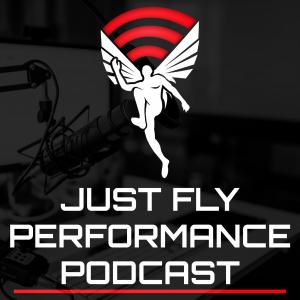Just Fly Performance Podcast

Adarian Barr on Rotational Forces, Torque and Speed-Multipliers in Athletic Movement
Today’s show is with coach and inventor Adarian Barr. Adarian has spent decades coaching in the college and private sector, and currently consults with a variety of coaches in multiple sports. Adarian has been a guest on this podcast many times, and has a unique, connected, and incredibly detailed perspective on the drivers of human movement. One piece of movement that we haven’t made a theme for this show yet is getting into rotational, “tumbling” actions of joints. When we think of “rotational force” in movement, we often just think of “twisting in the weight room”, or training “transverse plane”. When it comes to “front to back” movements, it is common to simply think in terms of perpendicular forces in terms of movement. With perpendicular actions, think of a coach telling an athlete to stab or drive their shin straight down to the ground in acceleration, for example, or any coaching cue that has to do with “pushing the ground away”. In any sport movement, however, the tumbling, or “pitching” motion of body segments (such as the shins) are going to be massively important when it comes to speed. It’s easy to load hundreds of pounds on a calf raise (a perpendicular force) but to be fast, think sprinting and throwing, rotation is inevitable, so it pays to be familiar with it to make better sense of movement coaching, and building better drills and constraints for athletes. On today’s episode, Adarian will speak on perpendicular versus rotational aspects of movement, and what it means for exercises, especially common sprint drills. He’ll talk about the actions of the various lever systems in the body, and how to optimize the way we load these levers for a variety of movements (with sprinting as the primary example) as we use rotation to move with speed. Adarian will talk about the ideas of “big and small wheels” as well as how not to make the wheel action of limbs a square one, as well as other interesting universal movement concepts. Today’s episode is brought to you by SimpliFaster, Inside Tracker, and Lost Empire Herbs. For 25% off of an Inside Tracker order go to info.insidetracker.com/justflysports For 15% off your Lost Empire Herbs order, head to lostempireherbs.com/justfly. View more podcast episodes at the podcast homepage. Timestamps and Main Points 5:20 – Looking at a “lever based approach” as opposed to a “force based” approach to biomechanics and movement 12:55 – The scope of true “perpendicular” movements in training, such as in-place pogo hops, in light of athletic movement that is rotational in nature 16:56 – A discussion on the hamstrings, and their role in rotational torque 22:01 – How to treat “perpendicular” oriented movements in regards to their transient, isometric nature 28:59 – The nature of the glutes and their rotational properties 30:55 – How to maximize “class 3” lever actions in the body as speed multipliers 33:30 – Squatty running and single leg bounding as rotational assessments and training paradigms 36:44 – Adarian’s take on upper body equivalents to folded running 46:13 – The principle of “big and small wheels” in movement, as well as why a circular wheel is superior to a square wheel 50:37 – How athletes will shift their “wheel size” when it comes to different athletic outcomes 55:44 – What is a “good” big wheel, and what things happening make a wheel “poor”, as well as how many sprint drills don’t actually train rotation 1:03.42 – A recap on the types of levers present in movement 1:05:20 – Looking at rotation and class 3 opportunities in the weight room 1:10:40 – What roller skating can teach us about levers and human movement “There is no way to move without a rotational component being added in there” “Everything we do is rotational, but the math is hard” “When we talk about sagittal, frontal and transverse plane, that is a location… a better term is pitch, yaw and roll”






 Visit Podcast Website
Visit Podcast Website RSS Podcast Feed
RSS Podcast Feed Subscribe
Subscribe
 Add to MyCast
Add to MyCast